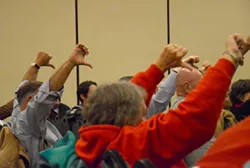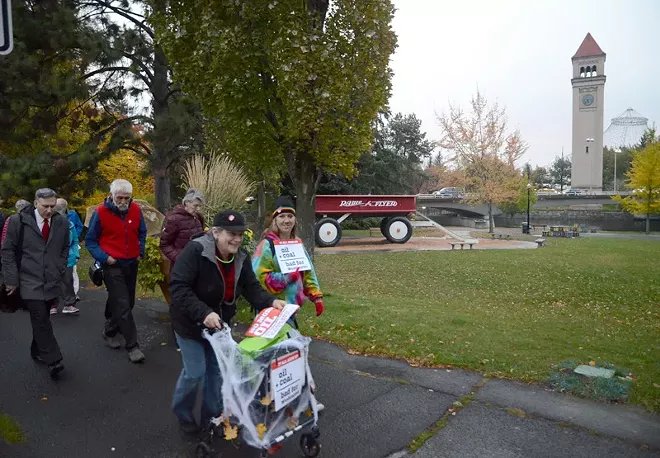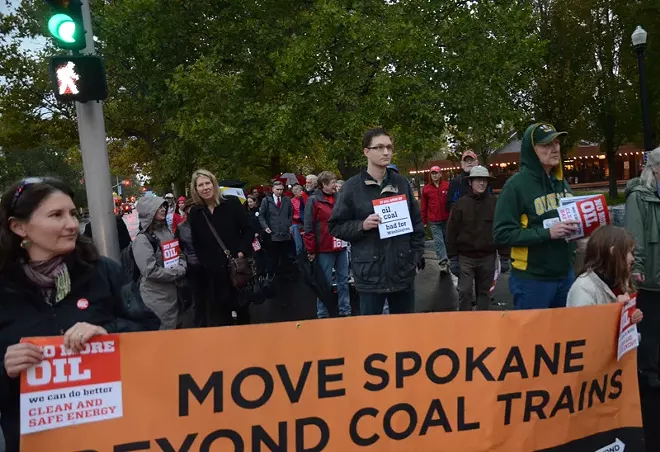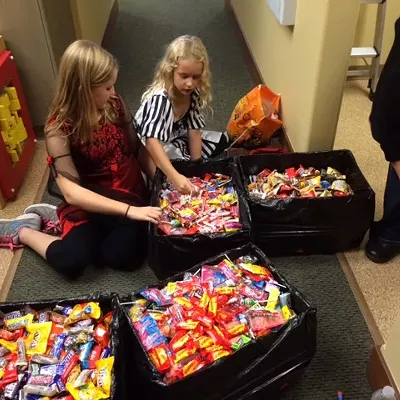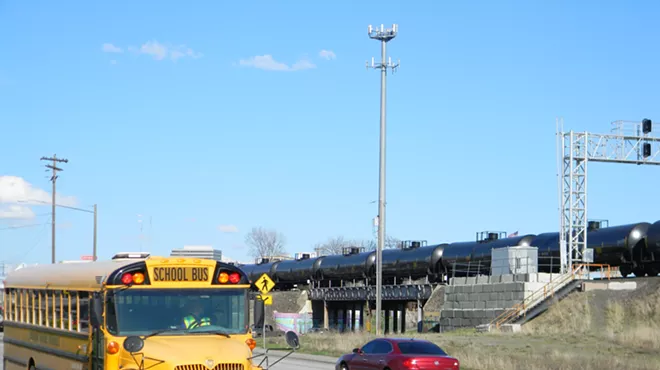Wednesday, October 29, 2014
Environmental, safety risks dominate public testimony on oil train shipments

Hundreds of concerned citizens waved their hands and protest signs in silent support as dozens of people offered public testimony Tuesday night against the increased crude oil traffic passing through Spokane. As part of an ongoing study of safety risks, the state Department of Ecology hosted the public hearing for local feedback on oil by rail.
Dale Jensen with Ecology's Spills Program emphasized the importance of the public feedback and thanked the group for attending.
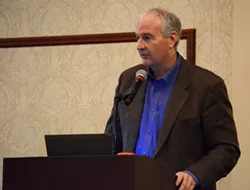
"It really is so important that all of you are here tonight," he says. "We have a new and ever-changing dynamic in our state. … We're now seeing a substantial increase in the amount of bulk oil traveling to and through Washington by rail."
Jensen says almost 9 percent of the state's oil now comes in via rail as three of five refining facilities have started processing product from the Bakken oil fields. Shipping oil by rail has skyrocketed in recent years, as have dangerous or deadly derailments.
Ecology recently released a 110-page preliminary report on expected increases in oil train shipments and the potential impacts of that traffic. Tuesday's hearing served as part of the continuing effort to evaluate the potential public heath and environmental risks.
Jensen says the preliminary recommendations include expanded rail infrastructure inspections, focusing on "high-risk" crossings. They also call for increased spill training for first responders, and emergency planning for smaller communities along rail lines.
State agencies have already started drafting legislation around those recommendations to introduce in the upcoming session.
Many local officials attended the hearing to share constituent concerns and demand urgent action from state and federal regulators. State Sen. Andy Billig notes his daughter, along with thousands of other students, attends school within blocks of the railroad tracks.
"An oil train derailment here would be catastrophic," he says, adding, "I urge you to revisit the draft recommendations and make them stronger."
Billig argues any rail plan must respect the values of safety and prosperity, and "oil trains impact both."
Spokane City Councilman Mike Fagan faced dozens of quiet thumbs-down hand motions from the audience when he suggested the region must invest in expanded rail capacity.
"Rail is an essential part of our trade-based economy," he argues. "The alternative is to stand by and watch that investment go to competitors like Canada and elsewhere."
Fagan says 10 percent of the state's GDP has ties to rail, which drives billions of dollars in jobs and wages.
"A pro-growth approach to transportation," he says, "is essential to securing the next generation of prosperity for Washington families."
Two other speakers voiced support for embracing oil train traffic. One man explained he had spent years living next to the railroad tracks without any fear for his safety or property. He described the attempt to impose new regulations as "government overreach."
The majority of the approximately 50 speakers strongly opposed any increase in rail traffic, and in several cases, any oil shipping through the state. Speakers from across the Inland Northwest, including many from Sandpoint and other areas of North Idaho, warned of unacceptable threats to human life, wildlife habitat and the region's aquifer.
Many accused the rail industry of sticking small communities with the risks and expenses of shipping oil while the railroads kept all the profit. They called for railroads to shoulder increased responsibility for rail inspections, emergency preparation and spill responses.
"Why are we expected to make it profitable for BNSF?" a woman asks, her 9-year-old daughter standing at her side.
Andy Hail, a deputy chief with Spokane Valley Fire Department, admits local agencies would struggle to contain a catastrophic fire as seen in photos of recent train derailments in North Dakota and Canada.
"Our responsibility here is to avoid the unthinkable," he says. "[But] we are going to be significantly challenged in the event that we have any spill. … We need to have a properly equipped rail-response capability."
In a short rally and march prior to the hearing, local officials and activists addressed additional concerns about the public risks of oil shipments. City Council President Ben Stuckart explains that a strong rail system used to be an economic advantage, while now many agricultural shipments find themselves delayed behind the ever-increasing oil traffic.
"What have they done to deserve to move to the front of the shipping lines over our products?" he asks, adding, "Wheat, potatoes and apples do not go boom and explode."
Twa-le Abrahamson, with the Spokane Tribe of Indians, notes the rail industry directly conflicts with many of the community's priorities and values.
"We have goals for our future generations," she says. "We have goals for clean water. … We want a safe city to live in. … No coal. No oil."
Ecology officials thanked the community for its engaged and thoughtful feedback. Officials expect to release an updated report in December. Additional comments can be submitted online.
See additional photos from the rally and march below:
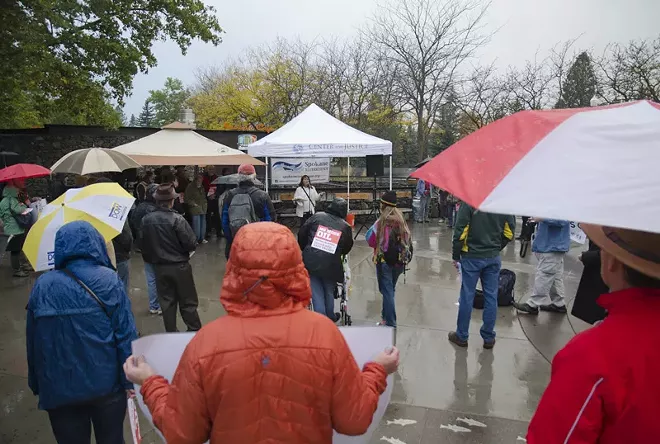

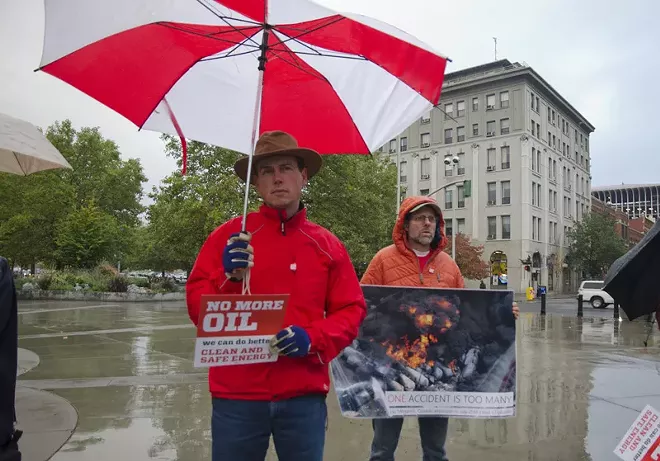
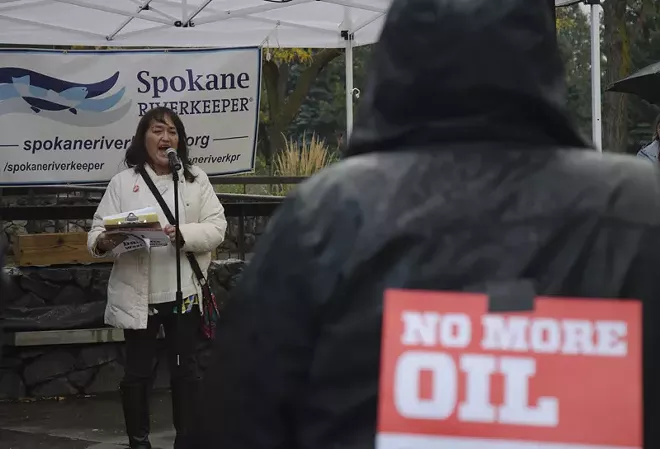

Tags: oil trains , Department of Ecology , News , Image

